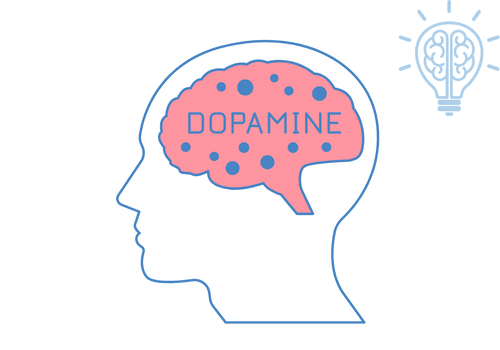What Is Dopamine?
Dopamine is a neurotransmitter—a chemical messenger in the brain—that plays a key role in motivation, focus, learning, and reward-seeking behavior. Often referred to as the “feel-good chemical,” it is responsible for reinforcing actions that bring pleasure, achievement, or excitement.
While essential for executive function and goal-directed behaviors, an imbalance in dopamine levels can lead to procrastination, distraction, impulsivity, or low motivation.
What Does Dopamine Do?
It helps regulate several critical brain functions, including:
- ✅ Motivation: Drives effort toward achieving goals.
- ✅ Focus: Supports attention and concentration.
- ✅ Learning & Memory: Enhances retention and problem-solving skills.
- ✅ Reward & Pleasure: Reinforces behaviors that feel good or provide a sense of accomplishment.
- ✅ Mood Regulation: Influences feelings of satisfaction and emotional stability.
How Dopamine Affects Executive Function
This neurotransmitter is closely linked to executive function skills, which control self-regulation, planning, and productivity.
- Task Initiation: Helps you start tasks without procrastination.
- Goal-Directed Persistence: Supports long-term effort and focus.
- Inhibitory Control: Regulates urges, helping resist distractions.
- Working Memory: Aids in holding and manipulating information while problem-solving.
- Attention Regulation: Helps sustain focus on meaningful tasks.
How Dopamine Works: The Brain’s Reward System
It is part of the reward system in the brain. It is released when we engage in activities that bring pleasure, success, or excitement.
🔄 The Dopamine Loop:
- 🎯 Anticipation: The brain predicts a reward from a specific action.
- ⚡ Action: You engage in the activity (e.g., working on a project, checking social media).
- 🏆 Reward: Dopamine is released, reinforcing the behavior.
This loop explains why we crave certain activities—whether productive (exercise, learning) or distracting (scrolling social media, snacking). Understanding this cycle helps us make this neurotransmitter work for us instead of against us.
Dopamine Imbalance: Too Much vs. Too Little
Maintaining balanced levels is crucial. Too much or too little dopamine can impact executive function and daily productivity.
⚠️ High Levels (Overstimulation)
Excess dopamine can lead to impulsivity, distraction, and addiction to instant gratification (e.g., excessive social media use, binge-watching, or gaming).
⚠️ Low Levels (Lack of Motivation)
Low dopamine can result in procrastination, fatigue, lack of focus, and difficulty completing tasks.
Ways to Naturally Boost Dopamine for Focus and Productivity
Instead of relying on quick fixes, focus on sustainable ways to regulate dopamine levels for long-term success.
✅ 1. Break Tasks into Small Wins
Completing small tasks triggers dopamine boosts, reinforcing productivity.
✅ 2. Use Habit Stacking
Pair new tasks with existing habits to create consistent reinforcement.
✅ 3. Delay Instant Gratification
Before checking social media, complete a meaningful task first to retrain dopamine response.
✅ 4. Engage in Physical Activity
Exercise naturally boosts dopamine, improving focus, mood, and motivation.
✅ 5. Optimize Sleep and Nutrition
Quality sleep and foods rich in tyrosine (e.g., nuts, fish, eggs) support dopamine production.
✅ 6. Practice Deep Work
Extended focus on a meaningful task triggers a natural dopamine release.
How Executive Function Coaching Can Help
If you struggle with motivation, focus, or impulse control, executive function coaching provides personalized strategies to help balance dopamine use and improve productivity.
Coaching can help with:
- Identifying dopamine distractions and limiting instant gratification habits.
- Creating dopamine-friendly routines for focus and productivity.
- Strengthening goal-directed persistence to improve motivation.
- Using behavioral reinforcement to build long-term success habits.
By understanding its role in motivation, individuals can create a balanced approach to work, focus, and daily habits.
📞 Want to improve focus and motivation? Contact us for executive function coaching today!




